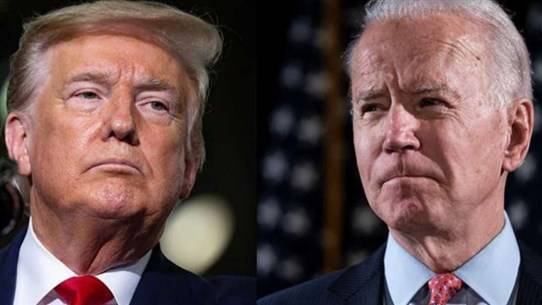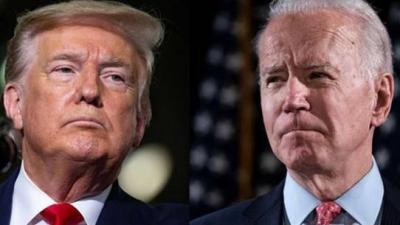In mid-November, during the G-20 summit in Bali, Indonesia, attention will be focused on the meeting between US President Joe Biden and Chinese President Xi Jinping to assess whether the two leaders will move towards reconciliation or confrontation.
The bilateral summit will be a test for President Biden in the wake of the midterm elections and the ongoing battle between the Democratic and Republican parties and its impact on Biden's political mood concerning US foreign policy. Former President Donald Trump, according to those close to him, will deliver a major speech next week regarding his vision for restoring America's greatness, during which he may announce his candidacy for the presidency. However, he will primarily focus on his role as the orchestra leader of the Republican Party's march toward the presidency in light of the midterm congressional election results, while also addressing US foreign policy as he envisions it.
There is no major disagreement over the core issues of foreign policy toward China, Russia, and Europe. Trump will not contest the G-7 industrialized nations’ efforts to isolate Russia at the G-20 summit and to ignore Foreign Minister Sergey Lavrov, who will represent Russia instead of President Vladimir Putin. However, as the US presidential race begins, and despite the Republican and Democratic wars focusing on internal economic, social, and ideological issues, foreign policy will specifically address countries such as Iran. The question arises: Will President Biden decide that reviving the nuclear agreement with Iran (JCPOA) from its comatose state will serve the US economy through lower oil prices, and that the timing is right after the midterm elections?
It is not easy to predict what Donald Trump will say, especially since his inner circle ensures the confidentiality of the announcement's content. Trump has returned to Twitter and may preempt himself. However, the rise of Florida Governor Ron DeSantis in this round of the elections has increased interest in him as a potential Republican presidential candidate. He is a dynamic man, with a striking and balanced personality, well-liked as a politician, but he may lack Trump's populism and might decide that his best interest does not lie in challenging "Donald," who has the means to control the Republican Party and the media.
Donald Trump himself may decide that it is best for him to be a "kingmaker" and become the "maestro" of the Republican Party's policy, doctrine, vision, and perspective, leading the party ideologically and internationally, while DeSantis undertakes the domestic local tasks.
Regardless of whether Donald Trump decides to be the presidential candidate or accept DeSantis's nomination—most likely he will run himself—what he wants is to fulfill his promise of restoring global greatness to America and to develop that vision with modernization. This means, according to one close associate of Trump's group, adopting a strategy of "maximum pragmatism" for the United States, which entails a "selective" foreign policy choosing a limited number of key countries, rather than a global one.
Regarding Russia, Trump will not present an alternative policy to Biden's as long as the Ukrainian war continues. He believes that had he been president during the countdown to the Ukrainian war, he could have persuaded Putin to refrain from invading Ukraine, blaming Biden for not preventing the world from the tragedies and consequences of the Ukrainian war from this standpoint alone. As for the current Western policy toward Russia, Trump will not cross the line now that things have reached their current state.
When it comes to China, it depends on how developments regarding Taiwan unfold. Here too, there is no fundamental difference between Republicans and Democrats, both disapprove of China's policies toward Taiwan and both share concerns about the impasse China would put the United States into.
The Chinese president in his third term has become more self-assured, supported fully by the military as well as the Politburo, which has granted him extensive powers. Additionally, the US's preoccupation with the Ukrainian war and the election campaign opens the door for adventurism and challenges concerning Taiwan. Therefore, it is not unlikely that the Chinese president will present his American counterpart with a fait accompli during their meeting in Bali, waving what China refers to as the "Taiwan Liberation Process."
What the Chinese president will demand is that the United States cease its presence in Taiwan, in all aspects of that presence, both actual and symbolic... or else, there will be a "liberation." Such a crisis would be difficult for Biden to navigate amidst the electoral battle given the serious implications of either scenario: reconciliation or confrontation. However, President Biden will not be alone in the predicament if he finds himself in it. Republicans and Democrats are on the same page when it comes to China and Taiwan.
Another focal point during the G-20 summit next week will be the anticipated battle between the G-7 group and the G-20 regarding Ukraine and Russia. Reports suggest that the leaders of the seven nations—the US, Canada, France, Germany, Italy, Japan, and the UK, as well as the European Union—have decided to address Ukraine with a condemnation of Russia and to ignore Sergey Lavrov to diminish Russia's stature.
However, major G-20 member countries like China, Indonesia, and India do not want to condemn Russia nor focus on Ukraine. These positions have immediate and long-term significance not necessarily as a support for Putin but as an objection to the West's approach toward Russia. These countries do not agree with the German Foreign Minister's perspective, for example, that Europe tomorrow can be "Europe without Russia."
Saudi Arabia is the only Arab member in the G-20, which includes the G-7 countries alongside China, India, Russia, Indonesia, Argentina, Turkey, Australia, Mexico, Brazil, South Africa, South Korea, and the Netherlands. Energy will be present at the summit, but it will not dominate it. Prices have begun to fall for various reasons, the most notable being that consumption in China has significantly declined due to its "zero tolerance" COVID policy and the resultant social movement restrictions. Therefore, China is no longer as thirsty for oil as it once was.
Regional crises will find their way into the G-20 summit, with the Korean crisis being the most noteworthy. Iran may have a modest presence at the summit, as the G-20 leaders are unlikely to take a stance on internal developments while they may wish to express hope for reviving the nuclear agreement.
Today, as the chances of reviving the nuclear agreement shrink, there are questions about whether the Biden administration will signal to Tehran the possibility of reviving negotiations if Tehran reconsiders its positions. However, Iran's direct involvement in the Ukrainian war prevents such a likelihood. Furthermore, the Republican Party, which will hold the majority in the House of Representatives, will be poised to scrutinize the Biden administration and restrict its actions regarding Iran.
The Ukrainian war dominates international and US politics. US National Security Adviser Jake Sullivan visited Kyiv last week to assess Ukrainian President Volodymyr Zelensky's readiness for a ceasefire and to reach a peace agreement, emphasizing that the decision rests solely with the Ukrainians. Zelensky has expressed his conditions for a ceasefire and negotiations, but not directly with Putin, rather at a lower level. The reality is that a ceasefire is far away, especially in light of the battlefield developments. Neither Putin nor Zelensky sees it in their best interest at the moment.
And as a well-informed source conveyed, it is not true that President Joe Biden has grown exasperated with his Ukrainian counterpart to the point of yelling at him in the past few weeks. That incident occurred last June and has not recurred since then. The Biden administration, like European governments, currently sees no way to exit the Ukrainian war nor is it ready to pressure Zelensky into major concessions. The world remains in the throes of the Ukrainian war, and countries' policies rely on its repercussions.
As for broader American foreign policy, it is unlikely to change significantly or entirely. What happened in the midterm elections falls into the context of internal division over the most important domestic issues for the American voter, namely economic and social matters. Perhaps one aspect of what these elections revealed is the Americans' need for new vigor and younger leadership for the upcoming phase—beginning with the electoral battle.




